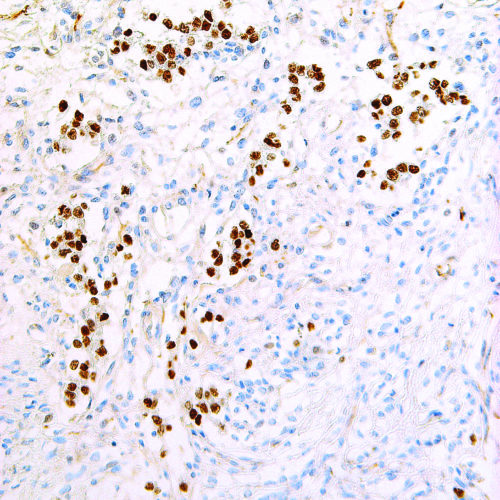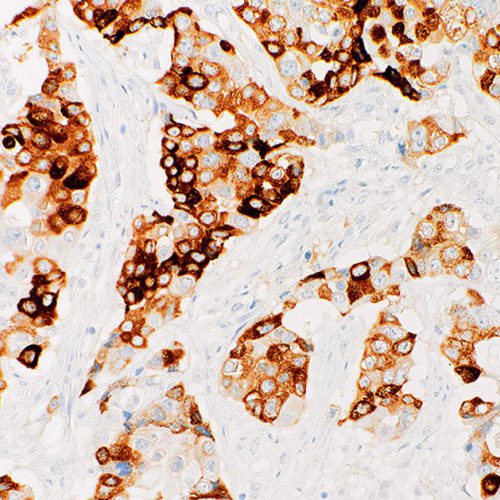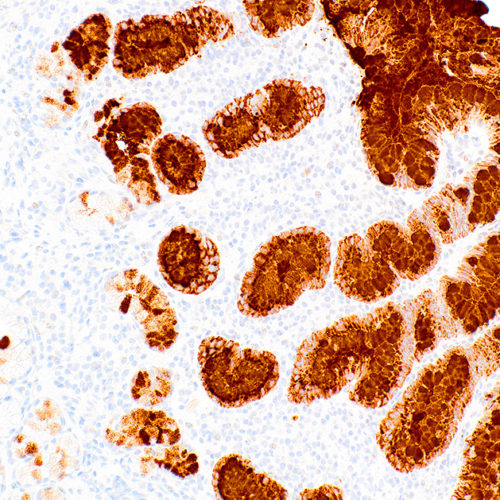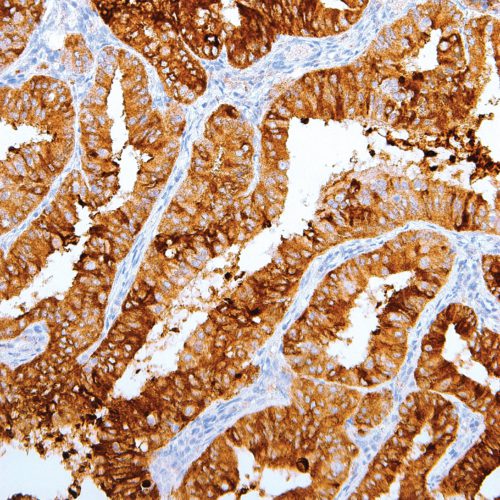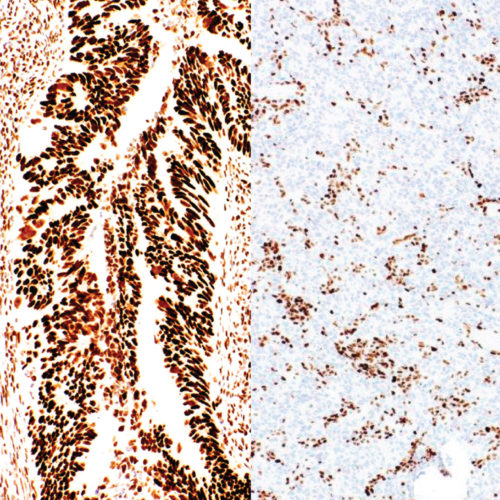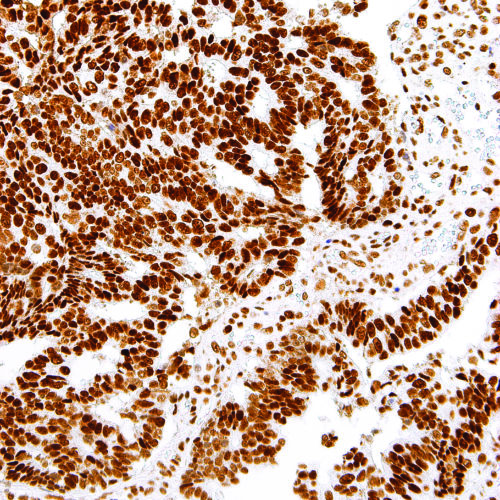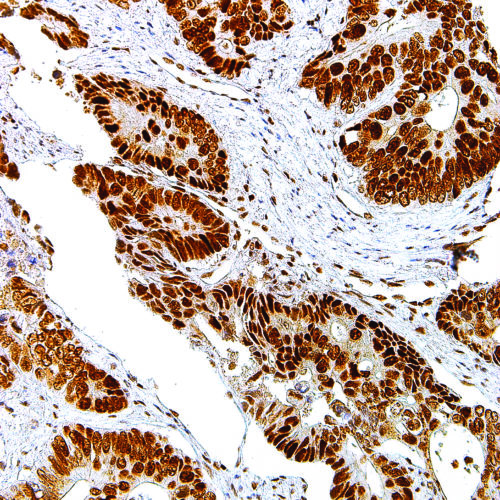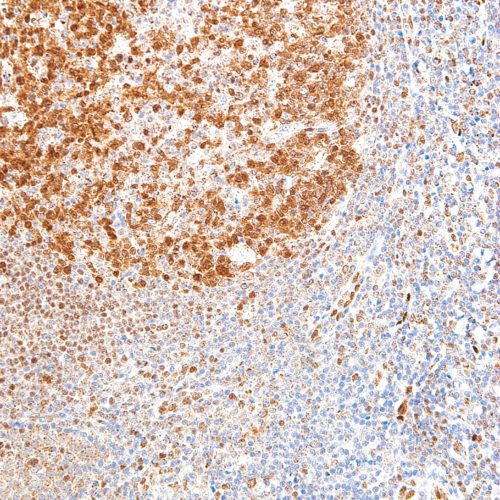High quality products to support Pathologists and Biological and Environmental Scientists
GeneAb™ Nanog
$107.50 – $435.38Nanog is a homeoprotein that functions with pluripotent factors such as Oct4 and Sox2 to maintain embryonic stem cell pluripotency. Expression of this protein has been noted in seminoma, dysgerminoma, embryonal carcinoma, and other undifferentiated germ cell tumors, while nanog expression is absent in normal adult organ tissues. Anti-Nanog may be useful in distinguishing between undifferentiated germ cell tumors and non-germ cell tumors.
GeneAb™ MUC6
$80.62 – $301.00Mucin 6 (MUC6) is a glycoprotein expressed in mucous neck cells, pyloric glands of the antrum, epigastric and bronchial epithelium, and in Müller ducts of the endocervix and urethral epithelium. Anti-MUC6 is useful for differentiating fetal, precancerous, and cancerous colonic mucosa from normal colon, as the antibody does not stain the latter. Anti-MUC6 stains the gastric epithelial surface of normal human gastrointestinal tract.
GeneAb™ MUC5AC
$80.62 – $322.50Mucin 5AC (MUC5AC) is a secretory-type mucin found in columnar mucous cells of surface gastric epithelium and in goblet cells of the fetal and precancerous colon, but not in normal colon cells. MUC5AC expression is indicated in carcinomas wherein the type is defined as diffuse and infiltrative, and those located mainly in the antrum. Studies have also suggested a correlation between MUC5AC and colorectal signet-ring cell carcinoma, with overexpression of MUC5AC relating to the carcinogenesis, malignant potential, progression, and clinical behaviors.
GeneAb™ MUC1
$86.00 – $322.50Mucin 1 (MUC1) is a membrane-bound glycoprotein involved in a number of protective and cell-signaling functions, including cell-cell adhesion, proliferation, motility, invasion, and survival. Overexpression of MUC1 is clinically indicated in breast carcinomas, papillary thyroid carcinomas, and thymic carcinomas, and reports have named MUC1 as a useful marker for differentiating thymic carcinoma from type B3 thymoma. The expression of MUC1 is correlated with the grade of malignancy in thymic epithelial tumors, and loss of MUC1 expression has been associated with reactive gastropathy. MUC1 is not expressed in normal human epidermis, but has been detected in the epidermis of psoriatic plaques of biopsies from patients diagnosed with psoriasis vulgaris.
GeneAb™ MSH6
$118.25 – $569.75MutS Homolog 6 (MSH6) is a protein involved in the mismatch repair pathway. This protein is commonly associated with hereditary non-polyposis colorectal cancer, and mutations in this gene are correlated with the development of sporadic colorectal carcinoma. Studies have shown that mutations in MSH6, when co-indicated with mutations in MSH1 and MSH2, contribute to the development of sporadic colorectal carcinoma. Use of Anti-MSH2 is optimized when paired with MSH6, MLH1, and PMS2 in an IHC panel.
GeneAb™ MSH2
$64.50 – $268.75MutS Homolog 2 (MSH2) is a protein involved in the mismatch-repair pathway. This protein is commonly associated with hereditary non-polyposis colorectal cancer, and mutations in this gene are correlated with the development of sporadic colorectal carcinoma. Expression levels of MSH2 are abnormally low in a high percentage of patients with microsatellite instability, as well as endometrial and ovarian cancers. Use of Anti-MSH2 is optimized when paired in an IHC panel with antibodies against MSH6, MLH1, and PMS2. Reports have shown Anti-MSH2 to be useful in the detection of the protein in a number of normal and neoplastic tissues, and for identifying a loss of MSH2 in tumors that are microsatellite-unstable.
GeneAb™ MLH1
$102.12 – $489.12MutL Homolog 1 (MLH1) is a protein involved in the mismatch-repair pathway. This protein is commonly associated with hereditary non-polyposis colorectal cancer, as the MLH1 gene is frequently mutated in patients with this cancer. Studies have shown MLH1 to be deficient in a high percentage of patients with microsatellite instability, as well as endometrial and ovarian cancers. Use of Anti-MLH1 is optimized when paired in an IHC panel with MSH6, MSH2, and PMS2. Anti-MLH1 is useful in the detection of MLH1 in a number of normal and neoplastic tissues, and for identifying a loss of MLH1 in tumors that are microsatellite-unstable.
GeneAb™ LMO2
$118.25 – $537.50LMO2, also known as LIM-Only transcription factor 2, RBTN2, or TTG2, is an oncoprotein that is expressed in normal germinal center B-cells, as well as bone marrow hematopoietic precursors and endothelial cells. LMO2 plays a role in angiogenesis and hematopoesis, and its expression has been detected in erythroid and myeloid precursors, megakaryocytes, and also in lymphoblastic and acute myeloid leukemias. LMO2 protein expression has been noted in diffuse large B-cell lymphoma, the most common adult non-Hodgkin lymphoma, as well as follicular lymphoma, a neoplasm derived from germinal center B-cells that accounts for a number of cases of non-Hodgkin lymphomas.
